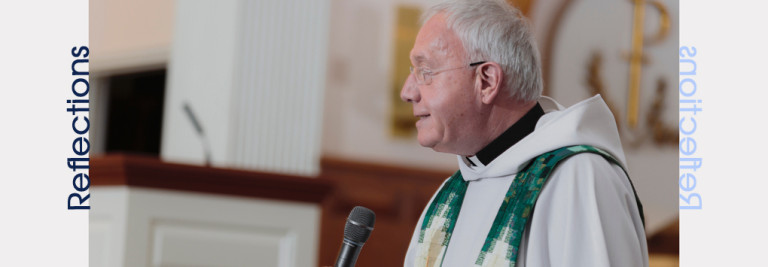May 3, 2015
Dear Parishioners,
I am presently reading selections from the writings of Thomas Merton, the Trappist monk who lived for some years in a small hermitage on the grounds of Gethsemani Monastery in Kentucky. I have always loved Merton’s works. They have that medieval feel about them. Reading him I can imagine myself in a Thirteenth Century monastery tucked somewhere in the French Pyrenees.
I have often wondered what life would be like to live in a Trappist or Carthusian monastery: little communication, long hours of contemplation, sung prayer, working alone on some task each day. In my younger days I had thoughts about becoming a monk, but I ultimately decided that I needed community; without it I would go “nuts.” The more I read of Merton, however, the more I have the sense that even monks and nuns need community. Given all that, I think one might say that the human person needs to be in a community of some sort in order to remain healthy. Human beings, by their very nature, seem to be created to be in community; it is practically impossible for us to get along without each other. It is as though we all share the same genes, the same human DNA, we are destined to live together whether we like it or not. Why is it, for instance, that we form communities of all sorts and join those who seem similar to us? Even little kids in the school playground insist on playing with one another – you will find few loners at recess time. Even though we may not get along with everyone, we know that there is someone out there who will complement us, reinforce who we think we are. We obviously live in an age where communication is key. It probably has always been so, but we notice it more today given the access to social media. With that, we are learning, as we may never have learned before, that we are one human family and that what affects one part of the human family affects the rest of us as well.
Jesus was extraordinarily sensitive to people who were somehow “ousted” from the human community: social outcasts such as Mary of Magdala, and the woman at Jacob’s well, the woman who washed Jesus’ feet with the scented oil, the lepers who were shunned and banished. Jesus could not stand to see people who were without community support. One gets the sense that Jesus chose twelve individuals to accompany him in his ministry so that he would have companionship, people to talk to, people to eat with, and people to stay with. I’m thinking also, for instance, of his special friends Mary, Martha and Lazarus. Could it not be true then, that when Jesus began to think about the future of his Kingdom, which turned out to be the foundation of the Church, that he referred to his friends in terms of vine and branches? They would have known what that meant immediately since they walked by vineyards every day. It is also interesting that in today’s first reading from the Acts of the Apostles we read that the Church began to grow by “leaps and bounds” in those early days. I can only imagine the reason for that growth was due to those “outsiders” who saw something special in those little communities of Jesus’ followers that attracted them, a certain bonding among them.
It is not so unusual then that the basic meaning of Church is community. This is why we gather each Sunday, precisely because we need companionship in our faith. When children are baptized into the Christian church, parents promise to raise them as part of a family of Christians. They need to know early on that they have a home to come to, that no one will turn them away when they come. As we grow in our Christian faith, if we do not feel at home there, something went wrong; somebody missed the boat early on. There is nothing clearer than the fact that we cannot be Christian alone. There is no such thing as a “private Christian” or a “private Catholic.” The word “Catholic” itself means “here comes everybody.”
Many of us do not have a problem finding community; some of us are naturally social. Many others in the world find this very difficult. There are lots of “loners” out there who are not so by choice. You may personally know some, I certainly do. The greatest act of charity that we could offer them is to help them find a place they can call home. It worked for Jesus. If it hadn’t, we wouldn’t be here today, would we?
Fr. Leonard+



